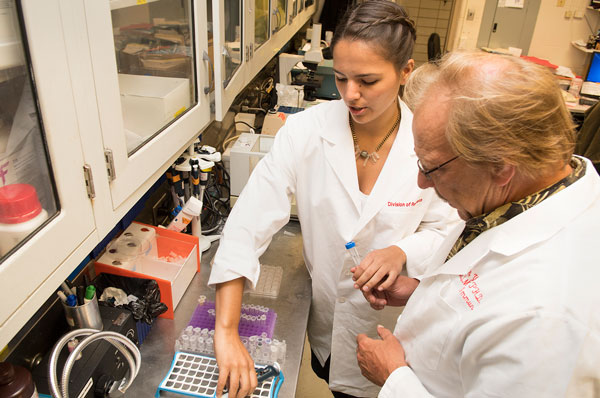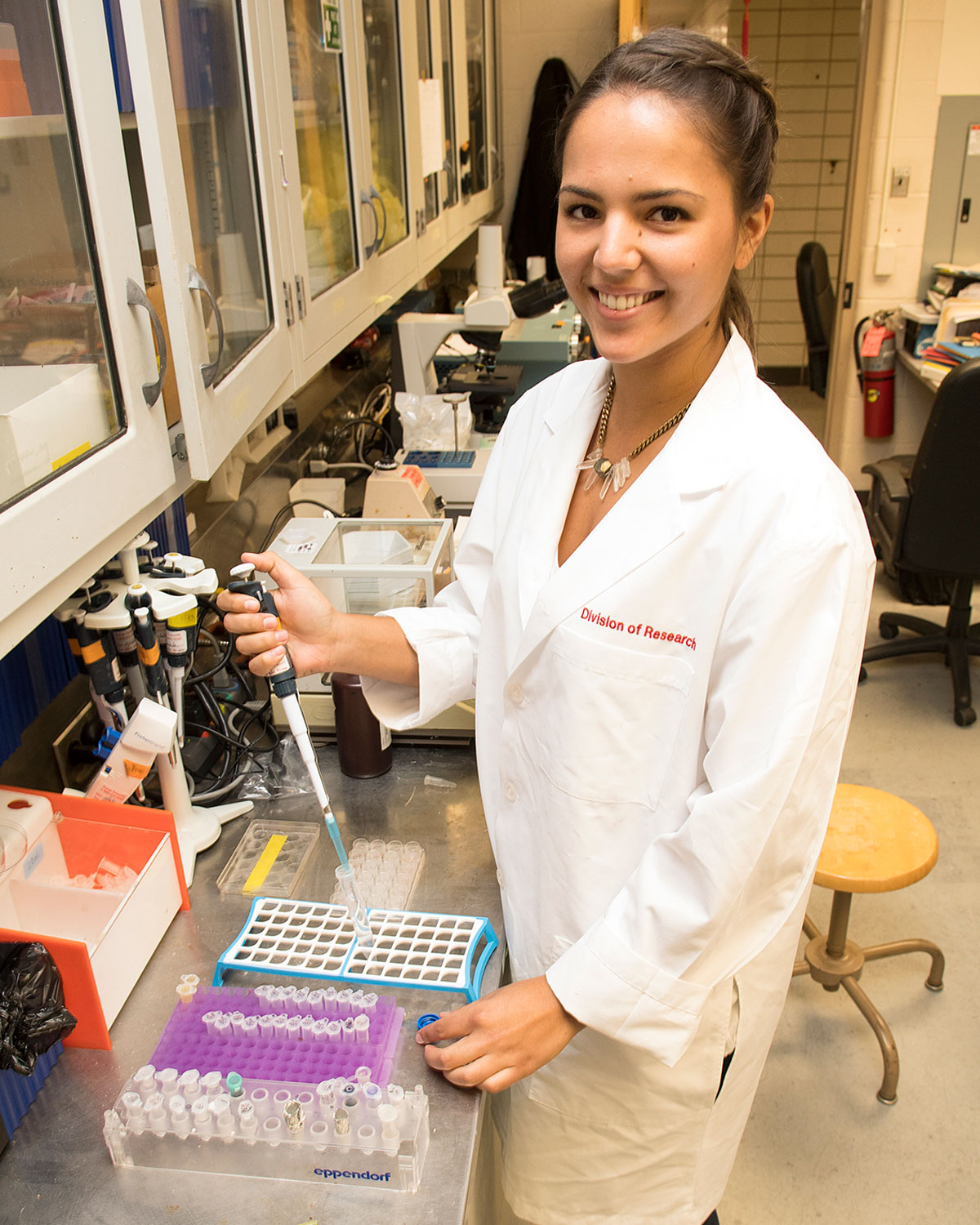Student Research Spotlight
Anahi McIntyre (MS/Biomed ’18)
August 29, 2017 Anahi McIntyre at work with Dr. Lindon Young.
Anahi McIntyre at work with Dr. Lindon Young.
Anahi McIntyre (MS/Biomed ’18) is pursuing a concentration in research at PCOM. She
graduated from Ursinus College in 2014, where she was a biology and Spanish double-major.
Her future plans include attending medical school.
What are you studying?
I work in the lab of Lindon Young, PhD, professor, microbiology and immunology, studying
myocardial ischemia/reperfusion (I/R) injury, which is the result of decreased blood
flow, and therefore oxygen supply, to heart tissue due to blockage of coronary arteries.
Reperfusion, or restoration of blood flow, is necessary for survival but also initiates
an inflammatory response resulting in injury. Currently, there is no effective therapy
to significantly reduce cardiac injury during reperfusion. Our lab is testing the
effects of a cell-permeable peptide inhibitor called protein kinase C epsilon peptide
inhibitor (Myr-PKC ε-), given during reperfusion in isolated coronary environments
subjected to 30 minutes of ischemia and 90 minutes of reperfusion. This project builds
on previous research conducted in Dr. Young’s lab by evaluating a longer reperfusion
period and dose-dependent curve. Our results suggest that Myr-PKC ε- effectively reduces
infarct size and dose-dependently improves cardiac function.
What prompted you to pursue research?
I first participated in research as an undergraduate at Ursinus College. I was excited
to contribute to the ever-expanding knowledge base of the scientific community. A
unique project that required critical thinking and occasional trouble-shooting was
a nice reprieve from the cookie-cutter lab classes in the science curriculum. That
experience prompted me to pursue research as a graduate student as well.
What experience do you have with conducting research?
From 2013-2014, I conducted cellular neurobiology research with Jennifer Round, PhD,
at Ursinus College. The research centered on elucidating intracellular binding partners
for Slitrks, a novel family of transmembrane proteins. In the fall of 2016, I began
my current work with Dr. Young at PCOM, and continue to work with him this year for
my research thesis.
What are your responsibilities in your current research project with Dr. Young?
 I assist in conducting experiments using a modified Langendorff heart preparation
for myocardial ischemia/reperfusion models and subsequent tissue staining and analysis.
This model serves as an appropriate screening tool to perform additional in vivo experiments
in the setting of I/R. I have also prepared posters for and presented our data at
the Experimental Biology 2017 meeting in April; at PCOM’s annual Research Day in May;
and at the 25th American Peptide Symposium in June. I plan to present additional research
at the 12th Annual Peptide Therapeutics Symposium in October, and again at the Experimental
Biology meeting in April 2018.
I assist in conducting experiments using a modified Langendorff heart preparation
for myocardial ischemia/reperfusion models and subsequent tissue staining and analysis.
This model serves as an appropriate screening tool to perform additional in vivo experiments
in the setting of I/R. I have also prepared posters for and presented our data at
the Experimental Biology 2017 meeting in April; at PCOM’s annual Research Day in May;
and at the 25th American Peptide Symposium in June. I plan to present additional research
at the 12th Annual Peptide Therapeutics Symposium in October, and again at the Experimental
Biology meeting in April 2018.
What is the broader impact of your research?
Coronary heart disease will remain a great threat to the population without novel
approaches. Our promising results suggest that Myr-PKC ε- could be a treatment that
could aid in clinical myocardial infarction/organ transplantation patient recovery.
Myr-PKC ε- focuses on preventing damage, as it targets early events in an inflammatory
cascade which ultimately leads to cardiac injury. I feel that Dr. Young’s research
is forward-thinking and provides hope for future patients. According to recent American
Heart Association statistics, over 700,000 heart attacks and 30,000 organ transplants
occur annually in the U.S. Myr- PKC ε- has the potential to reduce the health care
burden in the U.S. on a large scale.
You May Also Like:
About Philadelphia College of Osteopathic Medicine
Established in 1899, Philadelphia College of Osteopathic Medicine (PCOM) has trained
thousands of highly competent, caring physicians, health practitioners and behavioral
scientists who practice a “whole person” approach to care—treating people, not just
symptoms. PCOM, a private, not-for-profit accredited institution of higher education,
operates three campuses (PCOM, PCOM Georgia and PCOM South Georgia) and offers doctoral degrees in clinical psychology, educational psychology, osteopathic
medicine, pharmacy, physical therapy, and school psychology. The college also offers
graduate degrees in applied behavior analysis, applied positive psychology, biomedical
sciences, forensic medicine, medical laboratory science, mental health counseling,
physician assistant studies, and school psychology. PCOM students learn the importance
of health promotion, research, education and service to the community. Through its
community-based Healthcare Centers, PCOM provides care to medically underserved populations.
For more information, visit pcom.edu or call 215-871-6100.
Contact Us
For general media inquiries, please contact the Office of Marketing and Communications
at 215-871-6300 or communications@pcom.edu. Visit our media relations page to view contact information for public relations personnel.
Connect with PCOM

 Anahi McIntyre at work with Dr. Lindon Young.
Anahi McIntyre at work with Dr. Lindon Young. I assist in conducting experiments using a modified Langendorff heart preparation
for myocardial ischemia/reperfusion models and subsequent tissue staining and analysis.
This model serves as an appropriate screening tool to perform additional in vivo experiments
in the setting of I/R. I have also prepared posters for and presented our data at
the Experimental Biology 2017 meeting in April; at PCOM’s annual Research Day in May;
and at the 25th American Peptide Symposium in June. I plan to present additional research
at the 12th Annual Peptide Therapeutics Symposium in October, and again at the Experimental
Biology meeting in April 2018.
I assist in conducting experiments using a modified Langendorff heart preparation
for myocardial ischemia/reperfusion models and subsequent tissue staining and analysis.
This model serves as an appropriate screening tool to perform additional in vivo experiments
in the setting of I/R. I have also prepared posters for and presented our data at
the Experimental Biology 2017 meeting in April; at PCOM’s annual Research Day in May;
and at the 25th American Peptide Symposium in June. I plan to present additional research
at the 12th Annual Peptide Therapeutics Symposium in October, and again at the Experimental
Biology meeting in April 2018.